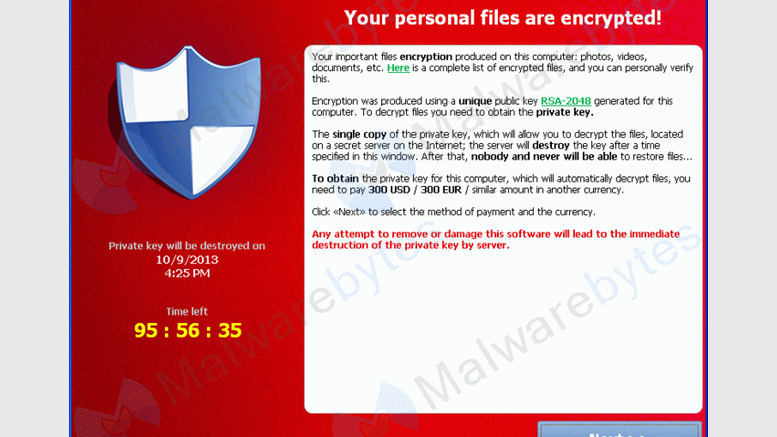
Many Refuse to Negotiate with "Bitcoin Terrorists"
TorrentLocker is one of the cyber world's most recent forms of ransomware, infecting several computer systems all over the globe and taking data hostage, refusing to release it unless a bitcoin ransom is paid. As of now, the primary victims appear to be countries in Europe. Nations such as Italy, Germany, France, Spain and the Czech Republic are on the list of prime targets, along with other nations such as the U. K., Australia and Canada. But a big shocker, however, is that out of approximately 40,000 victims only about 570 have ultimately paid the bitcoin ransom that TorrentLocker....
Related News
Tewksbury Police Department has reportedly paid a $500 Bitcoin ransom to hackers who had infected the department's files with a ransomware program called CryptoLocker. The malware program bogged down the police systems for 5 days after which the department finally decided to pay up. Chief of Police Timothy Sheehan said, "Nobody wants to negotiate with terrorists. Nobody wants to pay terrorists. We did everything we possibly could." Timothy went on to add that, "It was an eye-opening experience, I can tell you right now. It made you feel that you lost control of everything. Paying the....
After bitcoin, it is the deepweb which is now in the iron sights of the governments. Close to the heels of Russia trying everything in its capacity to make bitcoin illegal in the country, the French Minister for Interior Affairs is not targeting the darknet. Freedom of choice and free speech have become rare commodities these days and even in those small pockets where one can find it is being targeted by the governments across the world. Be it the United States government passing laws that conveniently erases the right to privacy from the constitutional rights of the citizens or the....
Bitcoin in the Headlines is a weekly analysis of industry media coverage and its impact. Due to their status as both an emerging payment method and payments technology, global authorities have long sought to ensure safeguards are in place to prevent digital currencies from being abused by cybercriminals and terrorists seeking to take advantage of their cash-like features. This narrative was given new prominence this week following the terrorist attacks in Paris last Friday, which left more than 100 people dead and that have found law enforcement agencies and politicians seeking to take....
Despite Europol’s statement that anonymous currencies are hardly used by terrorists, the European Commission will propose stricter rules on encryption and payment privacy in a bid to curb the financing of terrorism. Why are government officials afraid of Bitcoin? Government officials explain that “there seems to be a risk that virtual currencies may be used by terrorist organizations to conceal financial transactions, as these can be carried out more anonymously.” By being able to track financial flows, authorities hope to cut off terrorists’ access to funds and thus prevent attacks such....
With only two weeks left in 2016, bitcoin seems in a rush to “catch up.” For the longest time, analysts have predicted that bitcoin would reach $800 by the end of the year, and for the last few days, it seems like that prediction could become a reality. Currently trading at around $787, bitcoin is just $13 away from reaching such a stellar point. But not everyone is celebrating. The U.S. government is still employing the idea that bitcoin is the most popular currency amongst criminals and terrorists, who likely use digital currency to fund their evil deeds. Bitcoin-related crime is....





